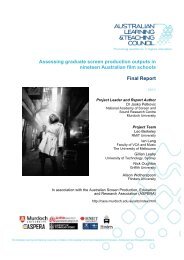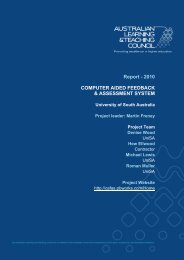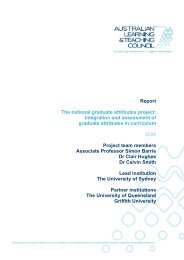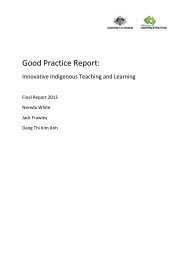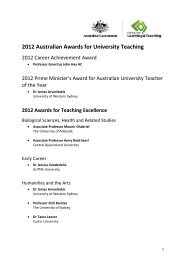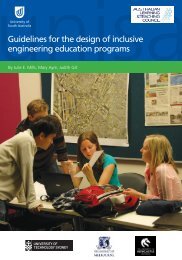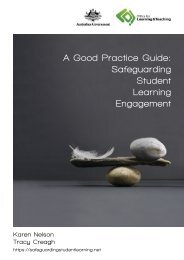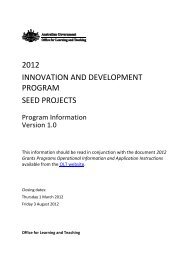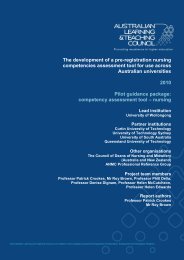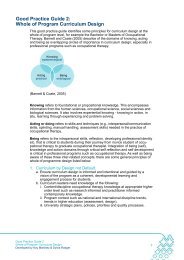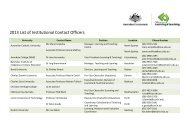about 13~14 weeks (12 teaching weeks, with one or two weeks’ break in between),plus one week <strong>for</strong> exam preparation <strong>and</strong> a two-week exam period. Given the shortduration, it is important that students work hard from day one. However, someinternational students may not underst<strong>and</strong> this, thinking that it’s not crucial to attendsome classes, particularly those at the beginning of the semester. This may result instudents missing important in<strong>for</strong>mation about certain assessment requirements ofthe subject, consequently leading to poor results.8.2 In classroom study skillsThis section presents some lecture-related classroom skills <strong>and</strong> advice, <strong>and</strong> tips <strong>for</strong>preparing an oral presentation.(1) Lecture-room related study skillsBe present <strong>for</strong> lecturesLectures are one of the main methods of delivering subject content at universities.Although a lecture may aim to achieve different outcomes, it generally provides asummary of essential knowledge in a subject area, demonstrates how to dosomething (e.g., solve a problem), stimulates your interest of subject topics, <strong>and</strong>guides your reading <strong>and</strong> research. Make sure you attend lectures regularly <strong>and</strong> listencarefully in all lectures – this will help you grasp the key concepts of the subject area,underst<strong>and</strong> key theories <strong>and</strong> practise key techniques/skills required <strong>for</strong> assignments<strong>and</strong> the final examination.The first lectureThe first lecture in a subject is one of the most important lectures of the semester. Itusually introduces very important in<strong>for</strong>mation about the unit/subject, such as unitcoverage, scheduling, assessment requirement <strong>and</strong> assignment setting (e.g.,assignment topics, mark distribution <strong>and</strong> due dates), <strong>and</strong> special learningrequirements. It is with this in<strong>for</strong>mation that students may plan ahead <strong>for</strong> specificlearning events during the semester/trimester. For example, if two or more units haveassignments due in the same week or on the same day, you may have to plan ahead<strong>and</strong> complete one of the assignments well be<strong>for</strong>e its due time. Make sure you do notmiss out on this in<strong>for</strong>mation or you may experience a number of difficulties during thesemester.The first five minutes of each lectureIt is essential to be in the classroom be<strong>for</strong>e the lecture starts: lecturers normallyannounce any useful in<strong>for</strong>mation about the unit/subject matter of the week during thefirst few minutes of the lecture. This in<strong>for</strong>mation may include updates to teachingmaterials, changes in the scheduling of tutorial or other teaching/learning activities,assignment global extension, assignment marking comments/feedback <strong>and</strong> so on.The in<strong>for</strong>mation may have an impact on your weekly learning requirement, but it maynot be included in the lecture slides. If missed, you may be unable to get it fromanywhere else, unless you ask you lecturer/tutor or fellow students after the lecture.In addition, most lecturers will outline the purpose of the lecture in the first fewminutes, <strong>and</strong> give you an idea of what they hope you might gain from the lecture. Assuch, it is strongly recommended that you be in classroom be<strong>for</strong>e the lecture starts.Effective listening in lectureMost international students from non-English speaking backgrounds feel it is hard tolisten effectively to lectures. This is specifically true <strong>for</strong> first year internationalstudents from such backgrounds. To be an effective listener, you need to improveyour concentration (i.e., maintaining motivation/focus), prepare <strong>for</strong> asking questions,analyse the message from the lecture, take notes <strong>and</strong> so on.Improve your concentration when listening to lectures141
There are ways of maintaining focus; <strong>for</strong> example, thinking about what the lecturermay say next, or considering the general point he or she may be making. You couldalso think about what has already been covered, <strong>and</strong> try to sum up the content in afew brief phrases. Sitting near the front of the lecture theatre is another way ofmaintaining focus. This will help you feel more involved <strong>and</strong> ensure that you can see<strong>and</strong> hear, as well as avoid possible distractions.Avoid doing any other work during lecture, even if you think the lecture is boring.Listening to the lecture should be the sole purpose of sitting in the lecture session. Itis costly to do any other activity during the lecture, such as catching up onuncompleted workshop/lab tasks, reading texts or doing assignments. By doing otherwork during lecture time, you have missed the opportunity to interact with thelecturer/tutor in learning the new content being presented, which in turn may result intaking you a longer time to catch up.Ask questions <strong>and</strong> analyse the messageConsider what else you would like to know about the lecture content beingpresented, <strong>and</strong> put these questions to the lecturer, if appropriate. If there is noopportunity <strong>for</strong> questions, write out your queries <strong>for</strong> your own research, or <strong>for</strong>discussion with the lecturer at the end of the lecture.Take lecture notesThe notes you take during a lecture should provide you with a summary of relevant<strong>and</strong> important points on the topic being presented. It is impossible to take downevery word <strong>and</strong> detail that is presented in the lecture, <strong>and</strong> if you attempt to do thisyou will be unable to listen actively. It is always a good idea to do some pre-readingto prepare <strong>for</strong> the lecture <strong>and</strong> listen carefully to the lecturer's introduction. In thisway, you will be more likely to identify the key ideas being presented. If much of thelecture material is available online or in your textbook, your notes should includeminimal detail. If the lecture slides are also available from the unit website, ashortcut is to print the lecture slides be<strong>for</strong>eh<strong>and</strong> <strong>and</strong> take them to the lecture as thebasis of your note taking.Listening or note taking?There is a balance between effective listening <strong>and</strong> note taking. It is recommendedthat you take lecture notes only when your English is good enough to comprehendthe lecture. Otherwise give the highest priority to listening. If you have difficulty inunderst<strong>and</strong>ing the lecture content in some cases, try to work harder at listening <strong>and</strong>identifying the main points of the lecture. In any case, never give up on listening tolectures.Asking questions vs. talking/discussion in classroomDon’t be too shy to raise questions in the classroom if you don’t underst<strong>and</strong> or if youneed further explanation of particular concepts. On the other h<strong>and</strong>, it is a very badhabit to talk irrelevant topics with fellow students during the lecture. This not onlyshows disrespect <strong>for</strong> the lecturer but also affects other students who are listening tothe lecture.Revision after the lectureRe-reading your lecture slides/notes, preferably on the day of the lecture, willincrease the likelihood of you remembering the key concepts of the lecture.(2) Oral presentation <strong>and</strong> related skillsOral presentation is usually a final stage of a group assignment or an individualresearch-based assignment (see also “group assignment” in the next section).Most students find it very stressful, even uncom<strong>for</strong>table, to speak to a group of142
- Page 1 and 2:
Strategies and Approaches toTeachin
- Page 3 and 4:
Table of Contents0 EXECUTIVE SUMMAR
- Page 5:
0 Executive SummaryAustralian terti
- Page 8 and 9:
1 Project OutcomesThe outcomes of t
- Page 10 and 11:
The identification information sect
- Page 12:
questions aim to discover their ass
- Page 15 and 16:
3.2 Literature reviewCross-cultural
- Page 17 and 18:
4 Survey Data AnalysisThis section
- Page 19 and 20:
Total Count 380 632 1012Percentage
- Page 21 and 22:
2 Count 12 30 42Percentage 3.1% 4.7
- Page 23 and 24:
Table 13 shows that nearly all loca
- Page 25 and 26:
methods are good, while less than h
- Page 27 and 28:
Preferredfewerlectures andmore labs
- Page 29 and 30:
Table 26 (Question III.4.D) Preferr
- Page 31 and 32:
Maindifferencesbetweenteachingmetho
- Page 33 and 34:
Table 33 shows that about half of l
- Page 35 and 36:
Table 38 (Question IV.4) Sufficient
- Page 37 and 38:
understanding lectures?Table 42 (Qu
- Page 39 and 40:
confident Count 301 179 480Percenta
- Page 41 and 42:
Table 49 (Question VI.4) Caring abo
- Page 43 and 44:
Table 52 shows that more local stud
- Page 45 and 46:
Table 56 shows that both local and
- Page 47 and 48:
a chi-square test to determine whet
- Page 49 and 50:
Significance Level (α= 0.05)Hypoth
- Page 51 and 52:
presentations are unrelated (Indepe
- Page 53 and 54:
Hypotheses V.2H0: Student category
- Page 55 and 56:
encountered at university in 2/3/4
- Page 57 and 58:
III.7What are you most concerned ab
- Page 59 and 60:
II.6.EII.6.FII.6.GTextbooks you pre
- Page 61 and 62:
VII. OtherVII.1.1VII.1.2What are th
- Page 63 and 64:
III.6 Do you like lecturers to ask
- Page 65 and 66:
distribution of these comments acro
- Page 67 and 68:
Figure 4.5 University of Sydney und
- Page 69 and 70:
Australia is the environment (11.06
- Page 71 and 72:
example, one student said that home
- Page 73 and 74:
5 Interview Data AnalysisThis secti
- Page 75 and 76:
class?Eight students thought studen
- Page 77 and 78:
(1) Did you have any difficulty sel
- Page 79 and 80:
5.2 Staff interview data analysisA
- Page 81 and 82:
(2) Do you think that the methods y
- Page 83 and 84:
is the biggest problem”. One lect
- Page 85 and 86:
comments was, “No, I send them to
- Page 87 and 88:
lecturer, and one of them like the
- Page 89 and 90:
am a shy person I am not comfortabl
- Page 91 and 92: When they have difficulties in read
- Page 93 and 94: (7) Have you been involved in many
- Page 95 and 96: Only two of the graduates had diffi
- Page 97 and 98: Furthermore, I was not familiar wit
- Page 99 and 100: ased communication style such as e-
- Page 101 and 102: CrosstabDifficultieswhenreadingtext
- Page 103 and 104: CrosstabPreferred workingin groups
- Page 105 and 106: CrosstabMain differencesbetween tea
- Page 107 and 108: CrosstabWhat are the maindifficulti
- Page 109 and 110: CrosstabDo you have anyEnglish lang
- Page 111 and 112: CrosstabDo you have anyEnglish lang
- Page 113 and 114: CrosstabAre you confidentabout your
- Page 115 and 116: CrosstabDo you have anyEnglish lang
- Page 117 and 118: CrosstabWhat are the mainstudy diff
- Page 119 and 120: Pearson Chi-SquareLikelihood RatioN
- Page 121 and 122: ead lecture notes.2. Regarding the
- Page 123 and 124: II.9 0.022 0.097 0.174 0.02 0.135II
- Page 125 and 126: From Table 65, we can see that ther
- Page 127 and 128: countries peoples. Personally, I fi
- Page 129 and 130: perceived by them as something insi
- Page 131 and 132: 7. Arrange peer groups for those st
- Page 133 and 134: covered (or not covered well) in th
- Page 135 and 136: 13. Ask assistance from internation
- Page 137 and 138: 11) • Weekly groupcase studies an
- Page 139 and 140: 8 Guideline for International Stude
- Page 141: life. However, it is very important
- Page 145 and 146: Expect to be nervous initially and
- Page 147 and 148: Avoid cheating and plagiarismAustra
- Page 149 and 150: 9 Disciplinary and interdisciplinar
- Page 151 and 152: 10 Results communication, publicati
- Page 153 and 154: Visiting Professor Javier Montero f
- Page 155 and 156: 11 ReferencesAsmar C. (1999), Schol



